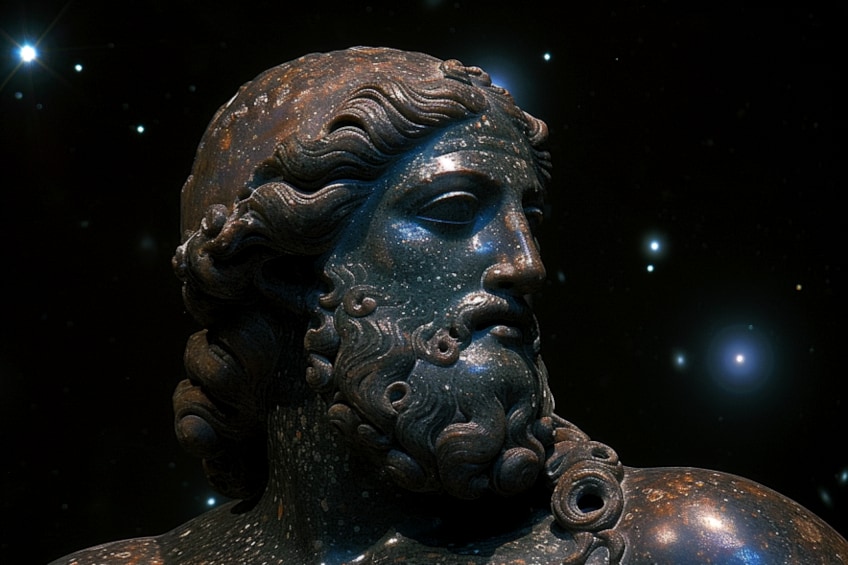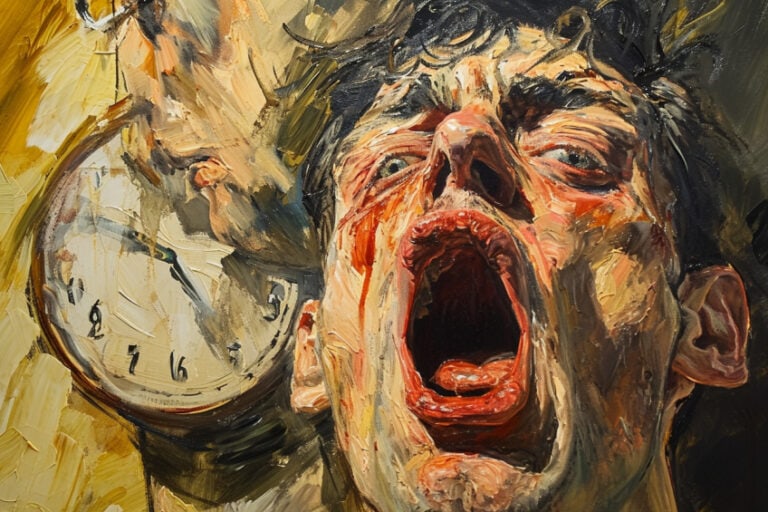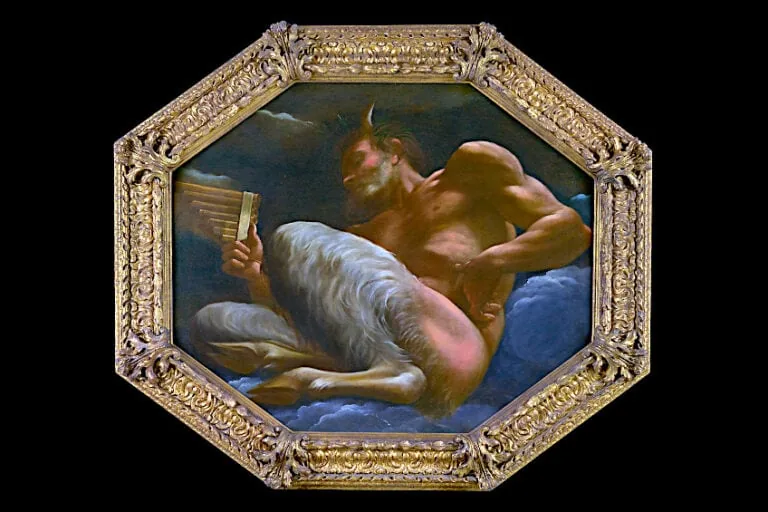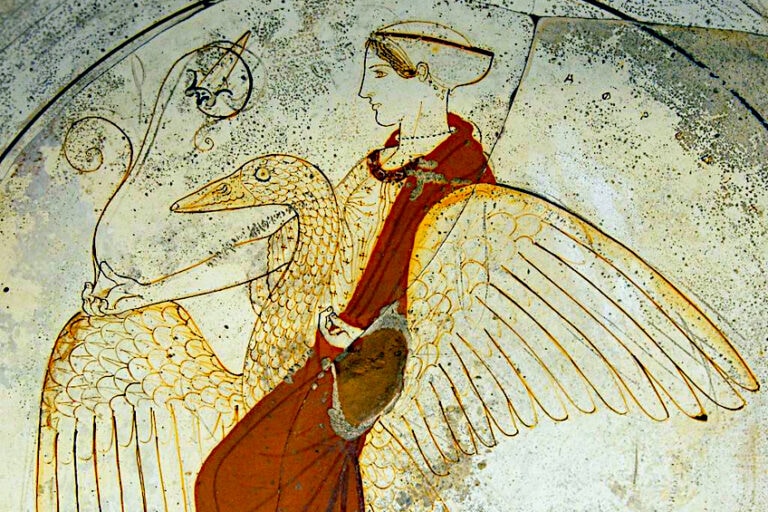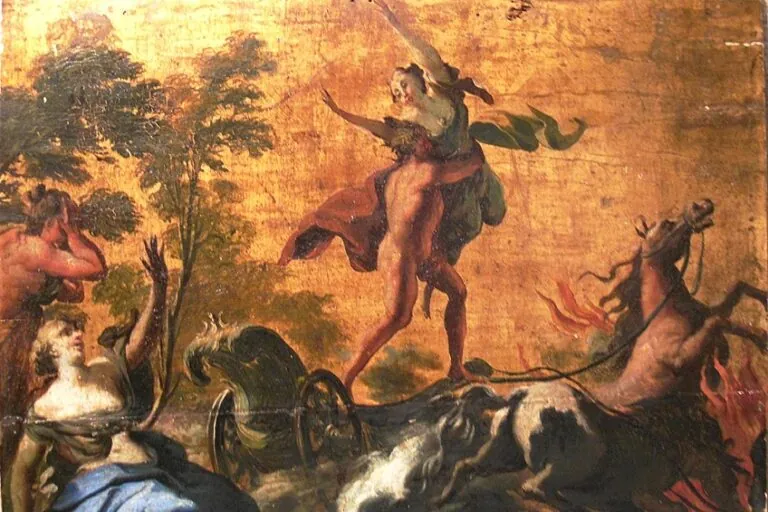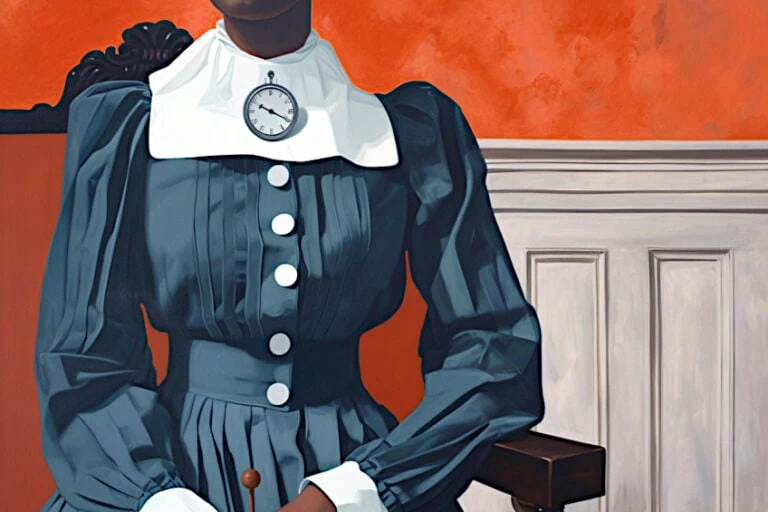Greek God Astraeus – Father of the Winds and Stars
The Greek god Astraeus is an important god when looking at how the Greeks conceptualized the world. While lesser known than his wife Eos, the dawn, this father-god of stars and winds is vital as the origin of the most intimate natural forces one can experience. While little is known of him directly, his presence is felt through his children and what his place in divine genealogy reveals to us about the ancient Greek world.
Overview of the Titan Astraeus
| Name | Astraeus |
| Gender | Male |
| God of | Stars |
| Personality | Persuasive, wise, and generous |
| Consorts | Eos |
| Children | Astraea, the Astra, and the Anemoi |
| Parents | Krios and Eurybia |
The Greek god Astraeus was considered the Titan god connected to stars, wind, and the dusk. Most known in surviving Greek mythology for Astraeus regards his more notable wife and children as well as his possible connections to the Giants.
What we know of Astraeus himself is mostly speculative. As it stands he fulfills the typical Titan role of cosmological and genealogical origin in Greek mythology.
Background of the Greek God Astraeus
The Titan Astraeus’ name, also known as Astraios, is believed to mean “starry” or “of the stars”, and is a derivative of ‘astḗr’ the Greek word meaning star. The origin of the word is thought to come from the Proto-Indo-European word for “star”, itself derived from a root meaning “to burn”.
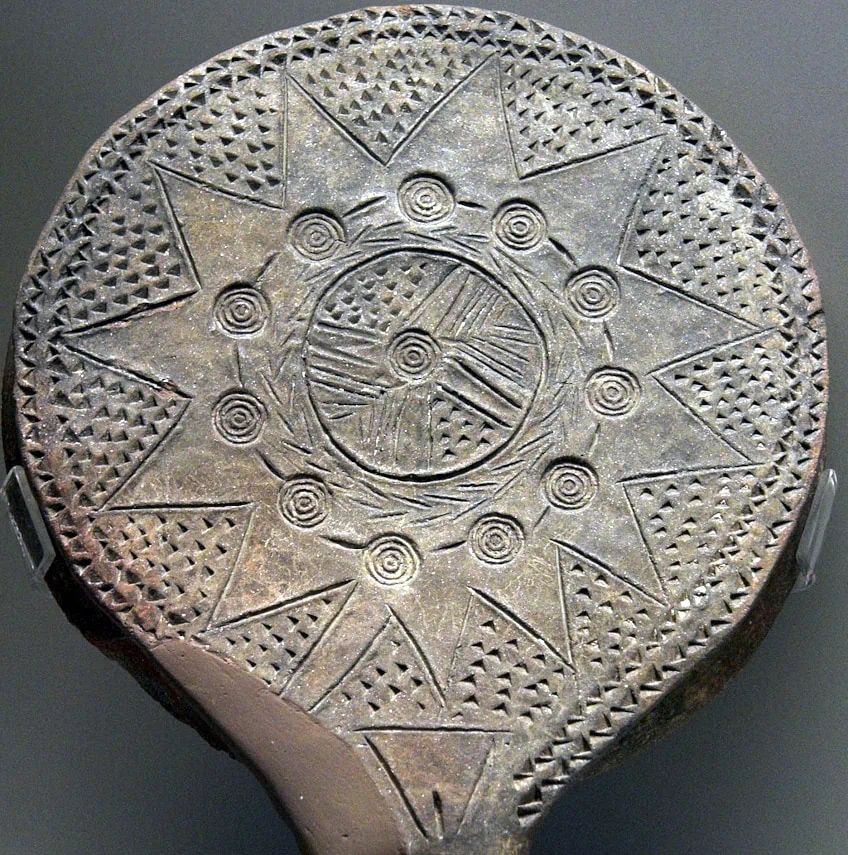 Early Cycladic Period II “frying pan” with a twelve-pointed star (2800-2300 BCE); Zde, CC BY-SA 3.0, via Wikimedia Commons
Early Cycladic Period II “frying pan” with a twelve-pointed star (2800-2300 BCE); Zde, CC BY-SA 3.0, via Wikimedia Commons
His origins and any cult appearances are currently unknown, though connections with several other minor gods have been proposed. His connection to stars and the directional winds is clear in mythology, however, he himself has also gained connotations with dusk and nightfall from less certain sources.
Astraeus’ Familial Relations
The Greek god Astraeus is traditionally a son of the Titan Krios, also known by the Latinized name Crius, who was one of the original Titan children accredited to the primordial pair Gaia and Uranus by Hesiod and Homer. His mother was the “flint-hearted” goddess Eurybia, a daughter of the sea-god Pontus and the primordial earth goddess Gaia. Astraeus is one of the three sons born to Crius and Eurybia, the other two being his brothers Perses “the destroyer” and Pallas “the spear-bearing”.
Astraeus, alongside other Titans like his brother Pallas and his uncles Iapetus and Ceous, is listed amongst the Giants born of Tarturus and Gaia, however, this has been suggested as a possible error or conflation.
Astraeus’ would marry and bear children with the personification of the dawn, Eos. The goddess Eos was his cousin by his uncle and aunt, the Titans Hyperion and Theia. Eos is currently Astraeus’ only named consort, and with her, he was believed the father of the Anemoi, or the directional winds. In older sources, the Anemoi only named the main four directions namely; Boreas of the North, Zephryos of the West, Notos of the South, and Euros of the East. Kaikas the North-East, Apeliotes the East where Euros becomes the South-East, Skiron the North-West, and Lips the South-West, were added to the group of the directional winds at some point so as to appear on the Tower of Winds in Athens.
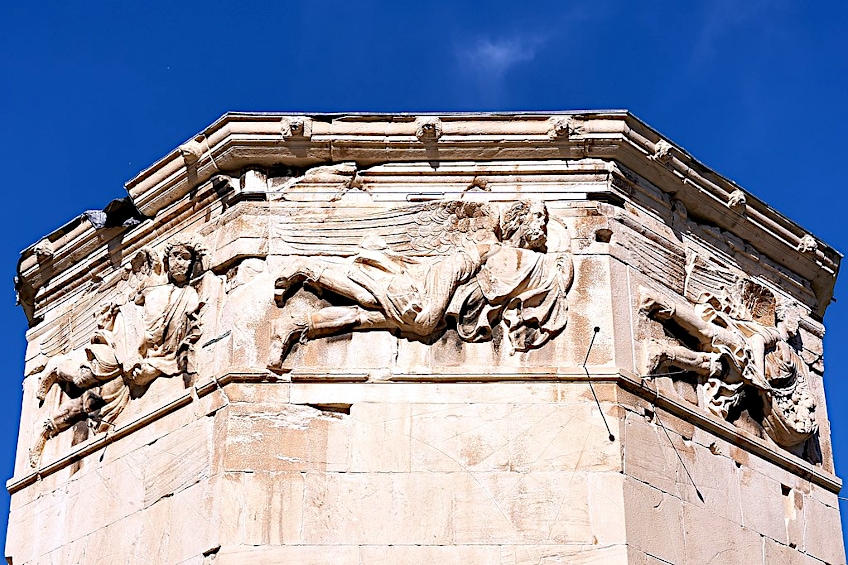 Relief sculptures depicting the winds on the Tower of the Winds in the Roman Agora of Athens (c. 50 BCE); George E. Koronaios, CC BY-SA 4.0, via Wikimedia Commons
Relief sculptures depicting the winds on the Tower of the Winds in the Roman Agora of Athens (c. 50 BCE); George E. Koronaios, CC BY-SA 4.0, via Wikimedia Commons
Astraeus’ is also the father of the Astra, translated simply to the general stars in the cosmos but also specifically linked to the Astra Planeta, the five “wandering stars”. The only names we know of the Astra Planeta come from later writings, which list them as Eosphoros, Stilbon, Pyroeis, Phaithon, and Phainon. Eosphoros the dawn star is more frequently and singularly mentioned, and is often conflated with Hesperus, the same star but in its role as the evening star. They have remained separate beings of mythology despite later knowledge of their shared celestial object.
The Significance of Astraeus in Greek Mythology
While not named as such directly, Astraeus is commonly grouped as a Titan, as the son of the Titan Crius and a god who lived during the Golden Age prior to Zeus’ overthrowing of the Titan Cronus during the Titanomachy. Astraeus’ role in this war is not referenced, nor does he have any other mentions outside of lineage connections, His role is thus largely linked to his genealogical and cosmological contributions, like many others of the pre-Olympian generation of gods.
His only true appearance is in the Imperial Roman era in a work of the Greek epic poet Nonnus.
Astraeus As the Father of The Stars
The Greek god Astraeus is known as the god of the stars through both his starry name and his primary role as the father of several star-embodying divinities. Astraeus is the father of the goddess of the Virgo constellation, Astraea, and a group known primarily as the Astra, translated simply to the Stars, who “crown the heavens”. The Astra are sometimes conflated with the Astra Planeta, however, they may be referred to as a separate or a concerted category depending on the source. The Astra Planeta were the gods of the “wandering stars”, who were actually the five planets of our solar system visible to the ancient Greeks with the naked eye.
The Planeta are Stilbon, Eosphoros, Pyroeis, Phaethon, and Phainon, which are the planets Mercury, Venus, Mars, Jupiter, and Saturn, respectively.
The dawn star, Eosphorus, and evening star, Hesperus, are considered two separate beings despite their physical embodiment eventually being discovered to be the same “star” on the planet Venus. Though the goddess Nyx is an alternative origin in the Orphic Hymn to the Stars 7, Atraeus is generally considered the father of both the “fixed” and “wandering” stars. These star children are important for a variety of reasons, as stars in pre-modern civilizations were not only mythological, but also used for time-keeping, agricultural cycles, navigation, and art symbolisms, as well as more mystical applications as messengers of divine will and reflections of personal fates.
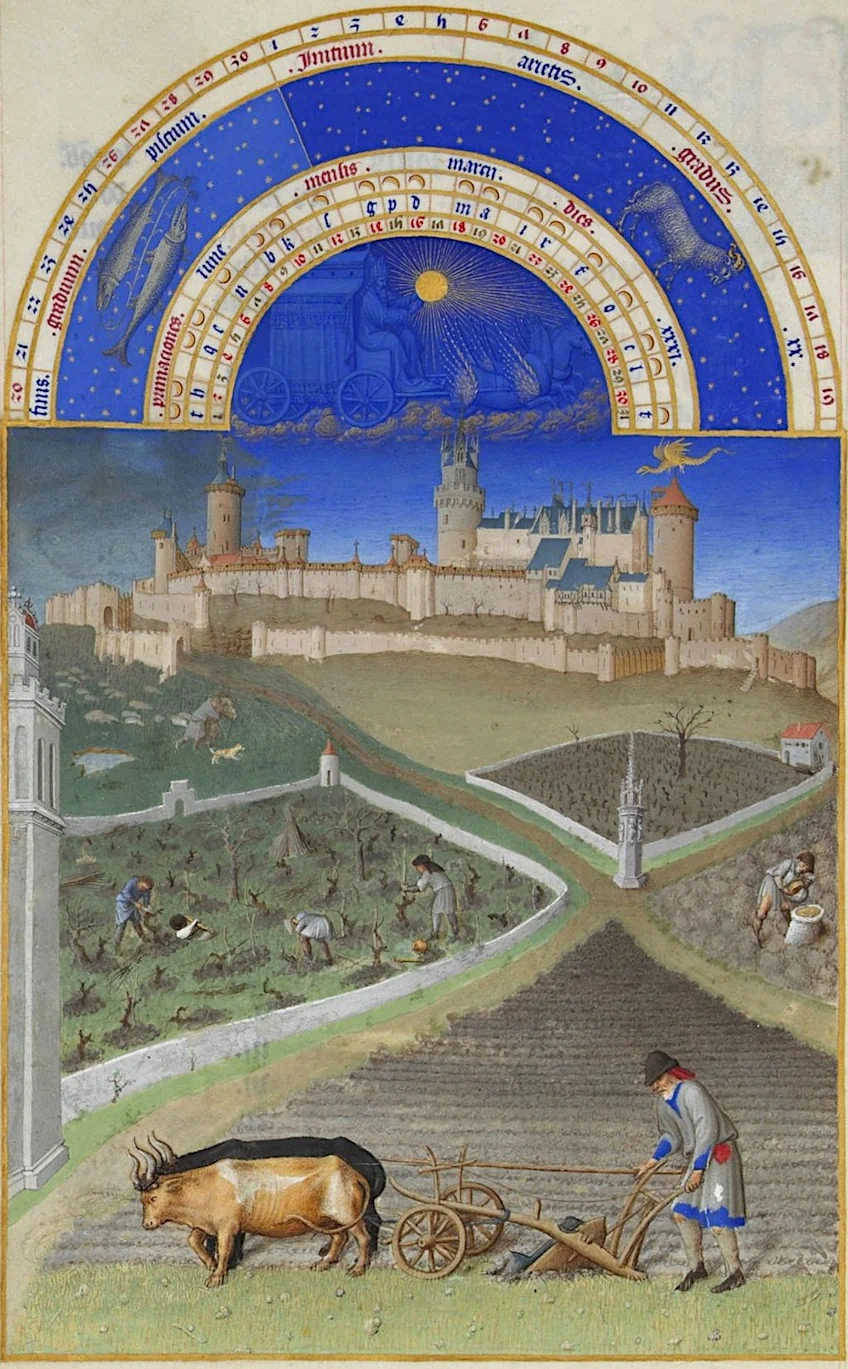 Painting from Les Très Riches Heures du Duc de Berry by the Limbourg brothers illustrating the ideal time to plough based on the position of the constellations (between 1412 and 1416 and possibly 1440); Limbourg brothers, Public domain, via Wikimedia Commons
Painting from Les Très Riches Heures du Duc de Berry by the Limbourg brothers illustrating the ideal time to plough based on the position of the constellations (between 1412 and 1416 and possibly 1440); Limbourg brothers, Public domain, via Wikimedia Commons
Alongside his role as the father-god of stars, Astraeus is also the father of the four directional winds, which reinforces his role as the origin of the heralds of the diurnal and seasonal cycles. The four winds, Boreas of the north, Euros of the East, Notos of the south, and Zephyros of the west, are also associated with the seasons. The cold winter, the autumn months, the breezy spring, and the summer storms, respectively.
Sources also tempt with the assumption that the star-associated god was a counterpart of his wife Eos, the personification of the dawn, as the god of dusk or twilight, but there is little classical evidence of this.
There is also little evidence for his role as a patron of navigation aside from the logical progression of using the stars, seasons, and directional winds as core tools to orient oneself in time and space.
The Astrologer Astraeus
Astraeus has little place in mythology, however, the poet Nonnus adds to him a role in a tale of the birth of Zagreus. Part of the Dionysiaca (5th century CE) details how Deo, more commonly known as Demeter, worried over the fate of her daughter Persephone, who had many suitors amongst the gods.
Distraught Demeter sought Astraeus in the story as a god of prophecy, which would fall under his aegis as a star god through the concept of astrology, where the position of stars is linked to one’s fate.
His children the Morning and Evening stars escorted her to their father’s halls, while the Anemoi, or the four winds, hosted her and offered refreshments. Astraeus of “sweet words” and skilled in persuasion got her to partake in a feast until she could no longer contain her anxieties and sought a divination that would put her worries at ease. Astraeus begins by reading a celestial sphere instrument of stars and zodiacs, along with the time and star positions of Persephone’s birth, and, to Demeter’s dismay, gives an oracle that Persephone would be ravaged by a “secret-” and “robber-” bedfellow to Demeter’s dismay. The oracle would reference Zeus coming to Persephone in the guise of a serpent and the union between them bearing fruit in the god Zagreus.
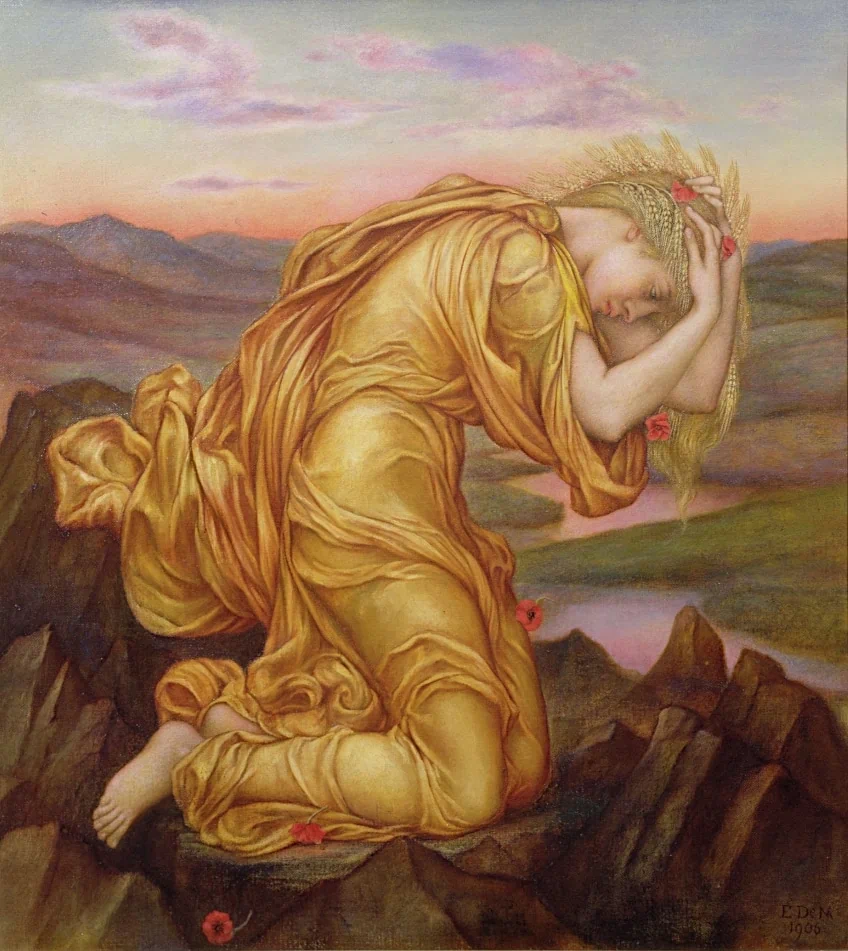 Demeter Mourning for Persephone by Evelyn de Morgan (1906); Evelyn De Morgan, Public domain, via Wikimedia Commons
Demeter Mourning for Persephone by Evelyn de Morgan (1906); Evelyn De Morgan, Public domain, via Wikimedia Commons
Alternate Associations of Astraeus
The Greek god Astraeus is linked to a few different figures of mytho-history. Astraeus is linked with Aristaeus, the source of the mid-summer soothing Etesian winds that followed the dog-star Sirius. Both gods are suggested to be related to Seilenos, a drunken wine-making Satyr god who was the father of the three Silenoi, one of which was named Astraeus by Nonnus.
His role as originator of the stars and seasonal winds also shares some likeness with “sparkling” Aeolus, believed to be the keeper of the violent storm winds.
Appearance and Attributes of Astraeus
Astraeus as a Titan with little place in myth had no dedicated cult that we know of. His descriptors are few and we have no definite artistic depictions of the god. There is a suggestion of his presence in a fragmented section of the Pergamon Altar relief based upon his mention in a list of the Giants, however, this listing is debated as a possible mistake and the fragments are inconclusive.
An interesting but conventionally unsubstantiated suggestion holds that Astraeus and his father and brothers may have some animal attributes to them, often proposed from certain stars and constellations they could be connected with.
Based strongly on Crius’ association with the ram constellation Aries, the supposition also links Pallas with the goat, from his skin becoming a, traditionally goatskin, aegis for Athena, and Perses as canine, from his daughter Hekate’s ties with the dog-star Sirius. Astraeus is suggested to be equine-featured from his wind-sons being depicted as horses or his connections to the satyr gods.
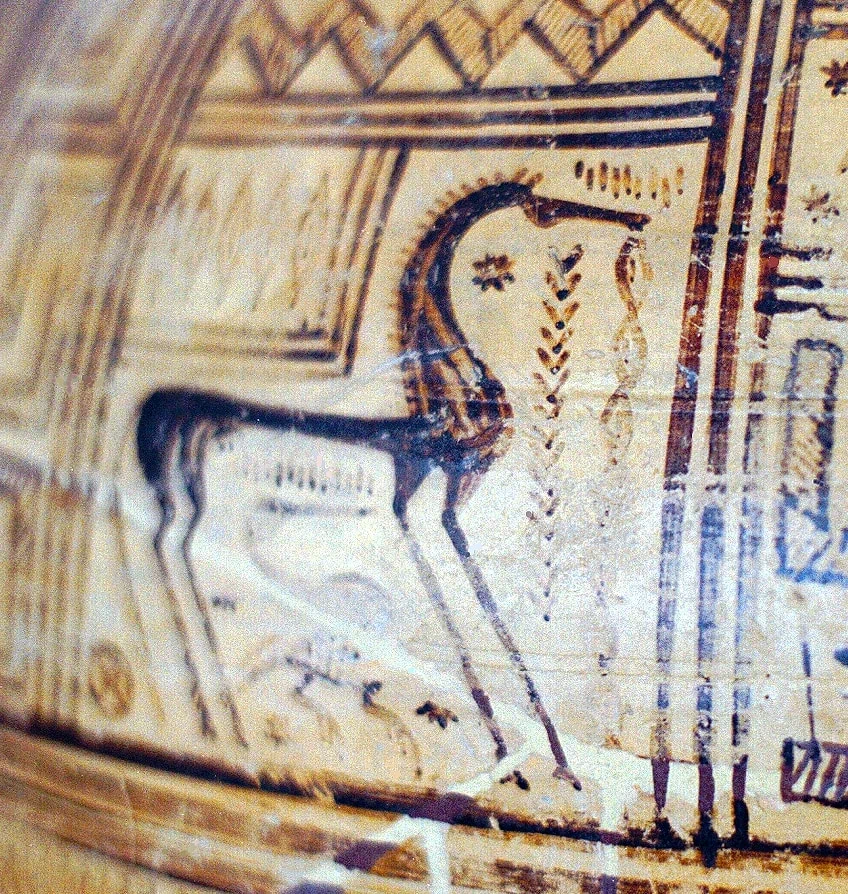 Greek Geometric Period pottery with a depiction of a horse (8th Century BCE); Zde, CC BY-SA 4.0, via Wikimedia Commons
Greek Geometric Period pottery with a depiction of a horse (8th Century BCE); Zde, CC BY-SA 4.0, via Wikimedia Commons
The Star-Father’s Attitude
We have few descriptions of the Greek god Astraeus and most of what we can surmise of his character is linked to his place in the timeline of the Greek mytho-historical narrative. Astraeus is a part of the early cosmogony of the ancient Greek world, being the father of the stars and winds with his wife Eos.
His only daughter with the lovely and lust-stricken Eos, Astraea, is specifically noted as walking the world during the Golden Age before she is placed in the sky as the constellation Virgo.
Astraeus is thus ancient in the tradition of Greek myth, but his only real appearance in myth supplied by the poet Nonnus further fleshes out this sense of age. He is old even in contrast to Demeter who seeks his wisdom, and his ancient aura directly supports his mystical knowledge of reading the future through astrology. He is shown as a benevolent and clever host, skilled in sweet words and persuading Demeter to calm down and partake of his table. Both his hospitality and his compliance with her pleas show a generous nature, while his skill at his esoteric arts translates to his wise image.
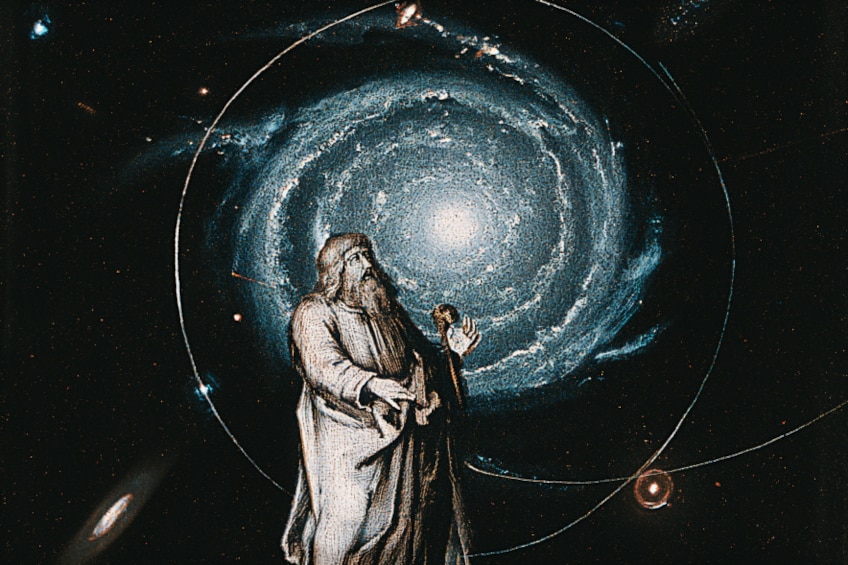 Astraeus as astrologer; artist’s impression
Astraeus as astrologer; artist’s impression
Attributes of Astraeus
Our starry Astraeus appears very little in classical source and surviving traditions, usually only as another name in the lineages of the gods. As an older god, and one more akin to an abstruse part of creation than a character to bargain with, Astraeus has no known cult following or localized mythos that we could find.
Thus we know of no places, symbols, times, or rituals that may have been held sacred by him.
Lessons of the God of Stars
While little can truly be known about Astraeus, following his trail has uncovered a valuable lesson of the importance of placement and perspective. His ancient and fatherly image is shaped by his place early in the Greek genealogical game. The majority of his importance comes from classical sources acknowledging his relations, as the husband of Eos and father of his children.
The many suppositions of his associations and attributes come from his connections to others and gaps one can find in the cosmogony of the ancient Greek traditions.
Astraeus’ identity itself is a perception born of perspective. By himself, the Greek god has little but his name, but as a being with relationships and a place in the greater Greek narrative he becomes a fascinating study. Being able to change your point of view, to take a step back to see the context of where something fits, is vital to understanding the true nature of things.
 Earthrise the famous photograph of the Earth taken by the Apollo 8 astronauts on 24 December 1968 marked the beginning of the era when humans could view and comprehend our planet from the context of space; Bill Anders, Public domain, via Wikimedia Commons
Earthrise the famous photograph of the Earth taken by the Apollo 8 astronauts on 24 December 1968 marked the beginning of the era when humans could view and comprehend our planet from the context of space; Bill Anders, Public domain, via Wikimedia Commons
Perspective is so important because things often only truly reveal themselves when looked at as it’s piece of a greater puzzle or it’s part of a larger whole. You can know the time by the dawn and dusk, or the place and season by the stars and winds, but only through their place in the greater world and your relation to it.
Similarly, the situations we find ourselves in, whether an interpersonal interaction or an intrapersonal conflict, doesn’t happen in a vacuum but as a consequence of numerous forces and motives.
The writings of Nonnus details how Astraeus retrieved a celestial sphere, and the time of Persephone’s birth, but it is only when he skillfully put the information together and observed the signs of the stars in relation to each other that he could decipher Persephone’s fate. So when you next come to a problem, take a moment to step back and truly observe it in all its parts, for it is through placing things into perspective that all things become clear.
Astraeus is one of the many of the older generation of Greek gods who have faded from history. He is an ancient and obscure entity who fathered the familiar stars and winds of the world, and is believed to be a god of stars and a practitioner of astrology. While not as well-known as others, his influence is felt strongly through the perspective of his progeny, who embody the vital pieces of nature that make up the world around us.
Frequently Asked Questions
What Was Astraeus the God Of?
While it is not explicitly stated, Astraeus has gained consideration as the god of the stars and, in light of Nonnus-given ties to prophecy, the domain of astrology as well. Aside from his name meaning starry or of the stars, his fathering of several star-connotated deities, such as the Astra Planeta and the constellation Virgo, is the biggest evidence for this connotation. He is also commonly noted as a god of dusk or nightfall, though this seems to be mostly based upon his wife Eos being the personification of the dawn rather than any classical evidence.
What Was the Significance of Astraeus?
Aside from his surface mythological role as the father of more familiar gods and goddesses, the Greek god Astraeus is also held largely as the originator of the stars and directional winds of the ancient Greek world. Both were often heralds of diurnal and seasonal changes in ancient cultures, and to the Greeks were also sometimes manifestations of godly messages, divine will, and reflections of the more personal fates of mortals and immortals alike.

I am deeply passionate about history and am constantly fascinated by the rich and complex stories of the past. As the editor-in-chief of learning-history.com, I have the opportunity to share this passion with a wide audience through the creation and distribution of engaging and informative content about historical events, persons, and cultures. Whether it’s through writing articles and blog posts or creating videos or podcasts, I strive to bring the past to life in a way that is both accurate and enjoyable. My expertise in history, combined with my strong writing and communication skills, allows me to effectively communicate complex historical concepts and make them accessible and interesting to a wide range of readers. I am truly grateful for the opportunity to share my love of history with others through my work on learning-history.com.

